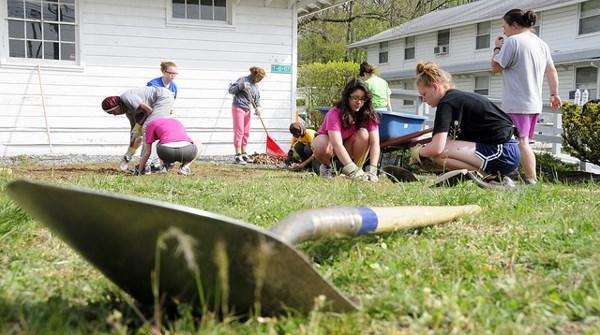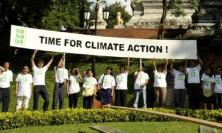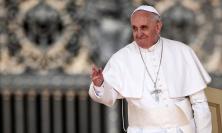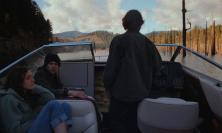Running through the whole of Pope Francis’ encyclical Laudato si’ is a call to ecological conversion, says Donal Dorr. This must take place, first and foremost, on a personal level, but there must also be conversion at the community level in order for any effects to be felt. How does Francis call us to transform our culture in order to care for our common home?
There is so much valuable material in almost every paragraph of Laudato si’ that any attempt to provide an adequate summary of the document is in danger of becoming almost as long as the 40,000 word encyclical itself. So I find it more helpful to focus on the central theme which runs right through the encyclical – the theme of ecological conversion. For Francis this conversion is primarily a personal, spiritual change in people, ‘whereby the effects of their encounter with Jesus Christ become evident in their relationship with the world around them’ (§217). But he goes on to say, ‘The ecological conversion needed to bring about lasting change is also a community conversion’ (§219). A large part of the encyclical is devoted to describing how the community dimension of an ecological conversion should be given expression or embodied in the economic, political, social and cultural institutions of our world. In this short article I propose to focus on just the cultural aspect.[i]
Francis reminds us that ‘culture is … a living, dynamic and participatory present reality, which cannot be excluded as we rethink the relationship between human beings and the environment’ (§143). He acknowledges the various ways in which technology has not only enabled humans to live more comfortably but has also contributed to human artistic achievements (§103). But he goes on to speak out strongly against what he calls a ‘technocratic paradigm’ which gives rise to the ‘tendency to believe that every increase in power means “an increase of ‘progress’”’ (§105). This mistaken idea ‘has made it easy to accept the idea of infinite or unlimited growth … based on the lie that there is an infinite supply of the earth’s goods, and this leads to the planet being squeezed dry beyond every limit’ (§106).
The technocratic mindset ‘ends up conditioning lifestyles and shaping social possibilities along the lines dictated by the interests of certain powerful groups’ (§107). Towards the end of the encyclical Francis returns to this issue. He says:
Since the market tends to promote extreme consumerism in an effort to sell its products, people can easily get caught up in a whirlwind of needless buying and spending. Compulsive consumerism is one example of how the techno-economic paradigm affects individuals (§203).
The kernel of the problem is that, ‘the economy accepts every advance in technology with a view to profit, without concern for its potentially negative impact on human beings. Finance overwhelms the real economy.’ This happens because groups whose only interest is in maximising profits do not prioritise ‘better distribution of wealth, concern for the environment and the rights of future generations’ (§109). Later in the encyclical Francis puts forward an even stronger criticism of this mindset: ‘Where profits alone count, there can be no thinking about … the complexity of ecosystems which may be gravely upset by human intervention. Moreover, biodiversity is considered at most a deposit of economic resources available for exploitation’ (§190).
According to Francis, if we are to create an ecological culture we need to adopt an alternative ‘distinctive way of looking at things, a way of thinking, policies, an educational programme, a lifestyle and a spirituality which together generate resistance to the assault of the technocratic paradigm’ (§111). He even goes so far as to borrow a notorious phrase from Mao Zedong when he writes that there is an ‘urgent need for us to move forward in a bold cultural revolution’ (§114.) A cultural transformation of this kind is the only way to counter ‘the mindset of those who say: Let us allow the invisible forces of the market to regulate the economy, and consider their impact on society and nature as collateral damage’ (§123).
Alongside our efforts to bring about a shift from the technocratic mindset, we need to work for the protection of non-Western cultures which have managed to preserve a healthier, more ecologically-oriented culture. Francis insists that ‘it is essential to show special care for indigenous communities and their cultural traditions’ (§146; cf. §179).
The whole question of employment and unemployment is, of course, a crucial economic issue. So Francis devotes several paragraphs to this topic, insisting strongly on the importance of safeguarding people’s employment (§124-129). However, it is important to note that Francis also sees work as a fundamental cultural issue. He maintains that a proper appreciation of the role and value of human work is an important element in the cultural change which he is calling for. This is because, ‘Work is a necessity, part of the meaning of life on this earth, a path to growth, human development and personal fulfilment’ (§128). Towards the end of the encyclical Francis notes a further important dimension to his understanding of work: ‘Christian spirituality incorporates the value of relaxation and festivity. … We are called to include in our work a dimension of receptivity and gratuity, which is quite different from mere inactivity’ (§237).
It is clear that, for Francis, the crucial element in an ecological conversion is a willingness to resist the present-day consumer culture. Referring to those who adopt a simpler lifestyle, he says, ‘Even living on little, they can live a lot, above all when they cultivate other pleasures and find satisfaction in fraternal encounters, in service, in developing their gifts, in music and art, in contact with nature, in prayer’ (§223).
Furthermore, he stresses the importance of the ‘historic, artistic and cultural patrimony which is … a part of the shared identity of each place and a foundation upon which to build a habitable city’ (§143). He maintains that this patrimony is under threat from the technocratic mindset. So an important aspect of the ecological conversion which he calls for is a serious commitment to preserve and develop people’s rich cultural heritage:
If architecture reflects the spirit of an age, our megastructures and drab apartment blocks express the spirit of globalized technology, where a constant flood of new products coexists with a tedious monotony. Let us refuse to resign ourselves to this. (§113)
We are being invited not just to change our mentality and mindsets but to find ways of embodying a new way of thinking, feeling and valuing in our buildings and our cities. Francis quotes from his Apostolic Exhortation, Evangelii Gaudium: ‘How attractive are those cities which, even in their architectural design, are full of spaces which connect, relate and favour the recognition of others!’ (§152).
As though to ensure that his concern about the design of cities could not be dismissed as elitist, Francis goes on immediately to address the very practical issue of the transport systems in modern cities. He agrees with those who insist on ‘the need to give priority to public transportation.’ But he also points out that this will not be widely acceptable if people have to ‘put up with undignified conditions due to crowding, inconvenience, infrequent service and lack of safety’ (§153).
Culture is largely shaped by formal education in schools, colleges and church-run programmes, as well as by informal education at home and through the media. Not surprisingly then, Francis has a lot to say about the ‘educational challenge’ which is required if we are to avoid environmental disaster (§202, 209). In a particularly valuable passage he says:
Environmental education has broadened its goals. Whereas in the beginning it was mainly centred on scientific information, consciousness-raising and the prevention of environmental risks, it tends now to include a critique of the ‘myths’ of a modernity grounded in a utilitarian mindset (individualism, unlimited progress, competition, consumerism, the unregulated market). It seeks also to restore the various levels of ecological equilibrium, establishing harmony within ourselves, with others, with nature and other living creatures, and with God. Environmental education should facilitate making the leap towards the transcendent which gives ecological ethics its deepest meaning. (§210)
An important component in a genuine ecological education is helping people to appreciate literature, poetry, art and the beauty of nature. Francis says, ‘By learning to see and appreciate beauty, we learn to reject self-interested pragmatism’ (§215). He also insists that the aim of education must be not merely to provide information but also to instil good habits, to cultivate sound virtues (§211). An ecologically-oriented education is integral: it seeks to shape more enlightened and responsible ways of thinking, of feeling, and of behaving.
I ask myself how significant and relevant to the world we live in is this call of Pope Francis to cultural transformation. In doing so, I remind myself that Francis maintains that concern for the environment and concern for the poorest in our world are intimately linked. He calls on us to ‘hear both the cry of the earth and the cry of the poor’ (§49, emphasis in original).
So I reflect on how my government is responding to the catastrophic situation in the countries on either side of the Mediterranean – and in the middle of that sea itself. Day after day the media calls my attention to the thousands of desperate migrants who have drowned; to the thousands who, having crossed, are now marooned in hugely overcrowded camps in Greece and Italy; and to the hundreds of thousands who wait their turn to attempt the perilous crossing.
I go on to reflect on my role as a citizen of a eurozone country in northern Europe, faced with the demand of the democratically-elected government in Athens for relief from an austerity programme which has obviously failed. I experience the historical irony of the fact that ancient Athens had a chequered history of struggle between democrats, oligarchs and monarchs – and that the still-relevant, classic texts of Greek philosophy and drama were the works of people who were immersed in that history. Are there similarities between the long-ago oligarchs of Athens and the privileged elites in Brussels, Frankfurt and Washington who believe they know best what is good for the poor in Greece? In a moment of fantasy, I might be tempted to suggest that the German chancellor and finance minister have deluded themselves into thinking that they are playing the role of the benign monarch of Plato’s Republic. But more sober reflection indicates that their position is based on a liberal capitalist ideology and a pragmatic awareness that they depend on the votes of the citizens in their own democracy.
These reflections lead me to see the relevance and the urgency of the call of Pope Francis for radical conversion in all the different spheres of our lives. I am beginning to realise that the major economic and political changes so challengingly outlined in other parts of the encyclical can never take place unless they are underpinned by widespread personal and community conversion and the kind of cultural transformation which Pope Francis is calling for. So before I ‘cast the first stone’ (Jn 8: 7) at our political leaders, I reflect on the challenge of Jesus to ‘remove first the plank from your own eye’ (Mt. 7:5). Now I ask myself to what extent I have become an unquestioning and complicit citizen of a small group of oligarchical countries where our comforts and luxuries come at the cost of the poverty of vast numbers of people in the rest of the world – and of the exploitation of their environmental resources.
Donal Dorr is a theologian and a member of St Patrick’s Missionary Society. He is the author of numerous books and articles on spirituality social justice and Catholic Social Teaching.
[i] I leave my reflections on the additional ways in which an ecological conversion is to transform our society to other publications, including the July 2015 issue of The Furrow.






